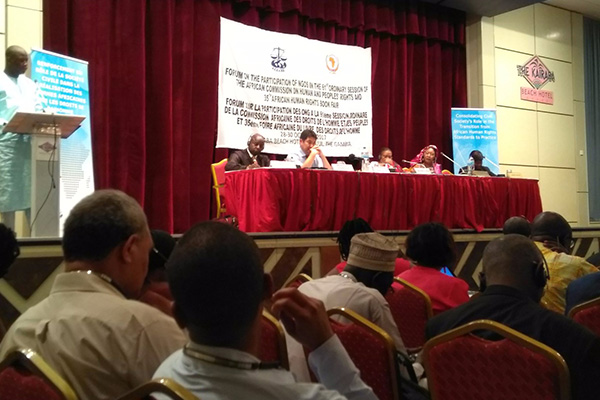
ACHPR61 | Outcome of the 35th NGO Forum
Lire cet article en français ici
Every year, the NGO Forum takes place ahead of the African Commission session. For its 35th edition, the NGO Forum was organised and facilitated by the African Centre for Democracy and Human Rights Studies (ACDHR) in collaboration with the African Commission on Human and Peoples’ Rights (African Commission) and the NGO Forum Steering Committee. Among the high number of participants, various stakeholders took part in the forum including civil society organisations (CSOs), national human rights institutions (NHRI) representatives as well as Commissioners of the African Commission.
This session of the NGO Forum was built around two specific thematic areas: the status of human rights and democracy and networking for human rights in Africa.
The first issue was central in allowing CSOs to put a light on the worsening human rights situation of this past year on the continent. The human rights situation of some countries such as South Sudan, Eritrea, the Democratic Republic of Congo (DRC) or Burundi, remain of concern. Through the second issue, the NGO Forum wanted to focus on its initial objective and be a central hub to promote and strengthen the collaboration between human rights defenders and with the African Commission.
The situation of human rights defenders
During this session, several human rights defenders from all over the continent shared their worries about the human rights situation in their country. They presented the human rights situation in each country of the region, highlighting the advancement and the important gaps in some countries. Defenders from Cameroon stressed the unsafe atmosphere in the country when defenders are victims of police brutality and the excessive use of force during peaceful protests, especially in the Anglophone part of the country where they have been ongoing protests. Defenders from Nigeria denounced the unlawful arrest and excessive use of force in the fight against terrorism, namely Boko Haram.
On a positive note, Malian and Burkinabe defenders shared the progress made in their respective countries towards the adoption of a national law protecting human rights defenders. Indeed, in spite of Burkina Faso adopting such a law in June and Mali in the process of doing so, they expressed the shortcomings which still need to be improved to guarantee an effective protection to defenders. They finally emphasised the need for their governments to work on an effective implementation and invited other countries of the region to keep working toward the adoption of such a law.
However, the current situation for human rights defenders in Burundi and the Democratic DRC remain of concern as their work has been made harder and more unsafe. For instance, in Burundi a number of defenders are still missing, among which Jean Bigirimana.
On the last day of the Forum, ISHR’s Clément Voule chaired an event on the national protection of human rights defenders. This was the opportunity to review the progress made in different countries and contribute to the regional reflection on ways to significantly improve the protection of human rights defenders on the continent. It also brought the attention on challenges defenders are still facing and the gaps that need to be filled in several countries in.
HURIDOCS also shared its concerns about the security challenges faced by HRDs in their attempts to publish documents in relation to human rights.
Interest Groups
NGO Forum were then invited to take part in interest groups focused on specific human rights issues. They then were asked to report on the work of the African Commission and how it could be improve to better the implementation of the targeted rights.
For these discussions, human rights defenders divided into groups and replied to a set of questions aimed at guiding the debate. To reflect on the 30 years of work of the Commission, the group working on issues faced by human rights defenders deplored the lack of regional framework to protect human rights defenders as it exists for child protection for example. They also highlighted the lack of enforcement of resolutions regarding defenders and called on the Commission to establish an emergency response mechanism which would help HRDs in immediate danger.
Similarly, the interest group working on extractive industries, the environment and human rights violations called on the Working Group on Extractive Industries (WGEI) to be more accessible to defenders to enable speedier responses to concerns and issues that arise. They also recommend that the WGEI consultations on the Guidance Note on Free Prior Informed Consent be finalised by the WGEI as soon as possible.
Adopted resolutions
On this occasion, the NGO Forum adopted 15 resolutions. 8 were country resolutions and 7 were related to specific human rights issues.
- Country resolutions
CRES/001/10/17: Cameroon (E/F)
CRES/002/10/17: Central Africa Republic
CRES/003/10/17: DRC (E/F)
CRES/004/10/17: Eritrea
CRES/005/10/17: Kenya
CRES/006/10/17: Libya
CRES/007/10/17: Sudan
CRES/008/10/17: Togo
- Thematic resolutions
TREC/001/10/17: Personal Data Protection and Cybersecurity
TREC/002/10/17: Independence of Judges and Lawyers
TREC/003/10/17: Land Rights and Housing
TREC/004/10/17: Transformation of Study Group into Working Group
TREC/005/10/17: Migrants, Refugees and IDPs
TREC/006/10/17: Women and Girls
TREC/007/10/17: Persons with Disabilities
